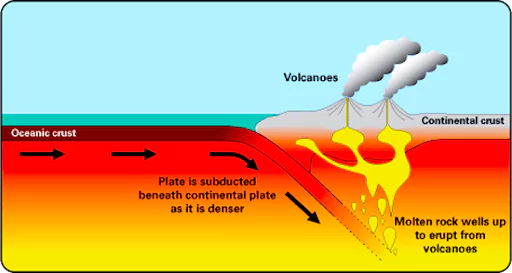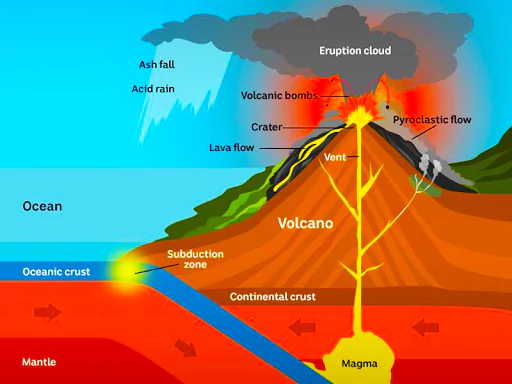Recently, a volcano in southwest Iceland erupted.
Volcanic activity in Iceland
It led to evacuations of the small fishing town of Grindavik and the popular geothermal Blue Lagoon spa.

- Iceland volcano, Sundhnuksgigar, has erupted for the 5th time since December 2023.
- This eruption follows another 8-week eruption nearby.
- Iceland’s volcanic activity has increased recently, with eruptions happening nearly every year since 2021. (Previously, eruptions occurred every 4-5 years).
Enroll now for UPSC Online Course
What are volcanoes?

- Volcanoes: They are openings or vents where materials like lava, small rocks (tephra), and steam burst out onto the Earth’s surface.
- Formation and Characteristics
- Formation: It results from the eruption of material much hotter than the surrounding area onto the Earth’s surface.
- Material Composition: It can include liquid rock (magma when underground, lava when on the surface), ash, and gases.
- Diversity in Location
- Land and Ocean: Volcanoes can be found both on land and under the ocean, exhibiting their activity in diverse environments.
Check Out UPSC Modules From PW Store
Reasons for Iceland to be volcanically active
- Geological Location
- Mid-Atlantic Ridge: Iceland is situated on the Mid-Atlantic Ridge, where the Eurasian and North American plates are moving apart gradually.
- Effect: This movement creates volcanic rift zones, where the Earth’s crust fractures, allowing magma to rise and sometimes erupt as lava and ash.
- Hotspot Presence
- Hot Zone: Iceland is also positioned over a hotspot, contributing to increased volcanic activity.
- Effect: This hotspot leads to enhanced volcanic activity in the region, adding to the geological dynamics of the island.
![]() 3 Jun 2024
3 Jun 2024


